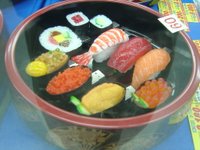Nippon News Volume 1 Number 3
Yet another week in Japan, and the string of major social faux-pas continues uninterruped. How was I supposed to know that one must always remove their shoes prior to entering a dressing room to try on some pants? Or that it is not 'cricket' to stab food with a chopstick and hoist it to ones mouth a la skewer? (I thought this was quite an innovation over the 'hunt and peck' mode prevelant among newly-arrived Westerners).
Nor it is really helpful in a restaurant to tell the waiter that Tempura actually was a Portuguese dish introduced into Japan in the 16th century. Or that saying 'Hi' in English really means 'Yes' in Japanese. (I thought I was only being frendly, but ended up with a souviner photo of Toyko and a persistant vendor wanting to be paid.) Or that 'yea' means 'Hello'. Just think of the Beatles lyrics, 'Yea, Yea Yea!”
[This usually kicks off the ever-popular Japanese verson of the old 'Whose On First' Routine in the restaurant –
Tea? [the waiter talking to me]
Yea!
Hello!
Hello Yourself!
You want Tea?
Yea!
Hello.
OK, OK - Enough!. How about some tea?
Tea?
Yea.
Hello! - Okhii? (means Big but sounds just like the English 'O.K.')
O.K. Good. Tea, then.
Tea! Okhii!
Yea!
Hello!!
(OH NO, not again!)].
I have a hard-enough time with words like Kinichewa [Good Afternoon], which sounds much like Can Greet You-All. And, oh yea, that little figure on the washroom door that you thought was one of Robin Hood's Merry Men; it's a woman! The first clue was that there was a missing porcelin fixture in the bathroom, and the give-away was that the walls were Pink, but by then I was aready inside the stall!
in the bathroom, and the give-away was that the walls were Pink, but by then I was aready inside the stall!
But the best is saying 'Thank You' in Japanese, which you will have to do many, many times each and every day. A complex culture here, there are multiple lyers of politeness involved, and quite the little linguistic dance as well. There is the bare-bones 'Domo', which simply means 'Thanks', or the improved model, 'Arigato Gaizimus', which sort of means 'Thank You'. Or, if the circumstances warrant, you can bring out the really big guns when necessary with the killer phrase, 'Domo Arigato Gaizimus'; Thank You Very Much! At least a cursory nod of the head is manditory while mumbling incoherently a badly-formed idea of what Japanese should sound like. However, I have noted that during the bow the head goes lower according to the length of the actual response involved. This, quite understanbly, motivates most Westerners to conjure up the briefest, but still curteous, reply that one can manage in most cases.
Armed with this crucial insight into the Japanese languarge, I had hoped to at least hope behave civily in a store when buying things, but I failed to appreciate that you also have to contend with the little physical dance that is associated with a sales transaction. When a clerk at a till says something (I have no idea what), I just smile and nod. You try not to give the game away by looking alarmed when they then stuff reams of packing paper into the bag, chuck in some advertising or coupons, poof-up the purchase (is poof a word?) by conducting what amounts to a mini-origami experiment on your four-volume set of the Three Stooges Greatest Out-takes (or whatever elese you thought you had to have), and even tape or staple the bag shut in an elaborate show of one-upmanship on the bag from the 'other store' that you have in your hand. You might or might not be handed the bill, but if not, it will be somewhere in the bag with the rest of the stuff. She/he then ususally contines to talk pleasantly (I think) until the climax of the intricate little dance, which hopefully ends with me being able to see the total on the cash register, able to knock off two zeros to figure out what is owed in Cdn. (to make sure it is a deal, after all), and to then proceed to fumbling wildly with uncertain currency.
They have way more coinage here, including the ususal pennies, nickles, dimes, quarters, dollar and two-dollar coins, but also a fiver, and a fifty-cent piece, as well as an assortment of things with holes in them; I have no idea what they actually are. In my first days in Japan I paid for a hot chocolate and two coffee with what turned out to be a $100 bill! The clerk even smiled!.
Meanwhile, back at the till, I had failed to take into account a critical insight into Japanese culture when paying for a purchase. Even though you have the money, one then MUST put the money INTO the little 'tip tray' that all the tills have. I had attempted to hand the money directly to the salesgirl, but she just stood there for a few seconds, smiling, but not taking the handful of metal and paper clutched in my extended hand. A major breach of social ettiquite had just occurred, but she was giving me the opportunity to redeem myself.
Slowly it dawned on me; 'something is wrong here'. Examining the salesclerk closely, I noted that while the smile was frozen in place and most abulatory action had ceased entirely, the sole exception was that her eyes were darting down and to her left side rapidly and repeatedly. A quick check assured that I was zipped, there was no evidence that she was having some sort of sizure, the fire alarm was silent and people weren't storming the exit, so I was momentarly stumped as to what was the problem. Then I followed her line-of-sight and ended up at the inconspicuous little 'tip tray' sitting on top of the cash register.
Ah! I get it now! As soon as I had placed the money in the tray the cashier immediately became animated once again, muttering something in her soft Oriental voice while opening the till to make the necessary change. With my eyes focused on the tip tray awaiting the appearance of my change, I then became aware that things had once again ground to a halt. Lifting my head, I met her eyes, which were now fixed directly on me. I then noted that she held the change in her outstretched hand.
Ah so!! The little-known Japanese Tip Tray Transfer Mechanism only works one way!
As soon as I had taken the money, the little wretch then proceeded to short-circuit my plans for a graceful exit by immediately bowing and saying clearly 'Domo Arigato Gaziamus.'
This completely flustered me. My mixture of stunned surprize and confusion must have been something like playing Shakespeare on stage and getting ready for your big monologue when the player at your side suddenly scoops Your Line. This was completely unexpected; somebody filtched my only line! Now what? Surely I couldn't just repeat the same thing!
I was so taken aback I only managed to mutter something in Japanese, which upon subsequent reflection I realize indicated that I thought she had really big asparagus, and left the clerk frozen at the till with a very puzzled look on her face. Bag in hand, I immeditely exited the shop without looking to either side, and certainly not backwards. My only blessing was that I would not likely see her again, either!
Christmas, or at least Christmas displays, are everywhere you go, but I am not entirely sure that the Japanese completely get the concept. I saw an animated 4-foot animal with a Santa Hat and a duffle bag over his shoulder singing in English a very passable 'Wish You A Merry Christmas'. Unfortunately, the miserable creature looked like a badly abused reject from a 1950s Huckleberry Hound Reminant (or is that ruminant) Sale. Come to think of it, I have seen store clerks wearing cute little Santa Hats, but very few Santas appear, and never any reindeer.
The Chistmas Tree is big here as a seasonal item as is Dean Martin or Bing Crosby singing You Know What; there are large and well decorated trees in most big stores downtown, and they even have them in 4” models that plug into your computer's USB port, in case you are in the mood for a little cheer while surfing.
Nor it is really helpful in a restaurant to tell the waiter that Tempura actually was a Portuguese dish introduced into Japan in the 16th century. Or that saying 'Hi' in English really means 'Yes' in Japanese. (I thought I was only being frendly, but ended up with a souviner photo of Toyko and a persistant vendor wanting to be paid.) Or that 'yea' means 'Hello'. Just think of the Beatles lyrics, 'Yea, Yea Yea!”
[This usually kicks off the ever-popular Japanese verson of the old 'Whose On First' Routine in the restaurant –
Tea? [the waiter talking to me]
Yea!
Hello!
Hello Yourself!
You want Tea?
Yea!
Hello.
OK, OK - Enough!. How about some tea?
Tea?
Yea.
Hello! - Okhii? (means Big but sounds just like the English 'O.K.')
O.K. Good. Tea, then.
Tea! Okhii!
Yea!
Hello!!
(OH NO, not again!)].
I have a hard-enough time with words like Kinichewa [Good Afternoon], which sounds much like Can Greet You-All. And, oh yea, that little figure on the washroom door that you thought was one of Robin Hood's Merry Men; it's a woman! The first clue was that there was a missing porcelin fixture
 in the bathroom, and the give-away was that the walls were Pink, but by then I was aready inside the stall!
in the bathroom, and the give-away was that the walls were Pink, but by then I was aready inside the stall!But the best is saying 'Thank You' in Japanese, which you will have to do many, many times each and every day. A complex culture here, there are multiple lyers of politeness involved, and quite the little linguistic dance as well. There is the bare-bones 'Domo', which simply means 'Thanks', or the improved model, 'Arigato Gaizimus', which sort of means 'Thank You'. Or, if the circumstances warrant, you can bring out the really big guns when necessary with the killer phrase, 'Domo Arigato Gaizimus'; Thank You Very Much! At least a cursory nod of the head is manditory while mumbling incoherently a badly-formed idea of what Japanese should sound like. However, I have noted that during the bow the head goes lower according to the length of the actual response involved. This, quite understanbly, motivates most Westerners to conjure up the briefest, but still curteous, reply that one can manage in most cases.
Armed with this crucial insight into the Japanese languarge, I had hoped to at least hope behave civily in a store when buying things, but I failed to appreciate that you also have to contend with the little physical dance that is associated with a sales transaction. When a clerk at a till says something (I have no idea what), I just smile and nod. You try not to give the game away by looking alarmed when they then stuff reams of packing paper into the bag, chuck in some advertising or coupons, poof-up the purchase (is poof a word?) by conducting what amounts to a mini-origami experiment on your four-volume set of the Three Stooges Greatest Out-takes (or whatever elese you thought you had to have), and even tape or staple the bag shut in an elaborate show of one-upmanship on the bag from the 'other store' that you have in your hand. You might or might not be handed the bill, but if not, it will be somewhere in the bag with the rest of the stuff. She/he then ususally contines to talk pleasantly (I think) until the climax of the intricate little dance, which hopefully ends with me being able to see the total on the cash register, able to knock off two zeros to figure out what is owed in Cdn. (to make sure it is a deal, after all), and to then proceed to fumbling wildly with uncertain currency.
They have way more coinage here, including the ususal pennies, nickles, dimes, quarters, dollar and two-dollar coins, but also a fiver, and a fifty-cent piece, as well as an assortment of things with holes in them; I have no idea what they actually are. In my first days in Japan I paid for a hot chocolate and two coffee with what turned out to be a $100 bill! The clerk even smiled!.
Meanwhile, back at the till, I had failed to take into account a critical insight into Japanese culture when paying for a purchase. Even though you have the money, one then MUST put the money INTO the little 'tip tray' that all the tills have. I had attempted to hand the money directly to the salesgirl, but she just stood there for a few seconds, smiling, but not taking the handful of metal and paper clutched in my extended hand. A major breach of social ettiquite had just occurred, but she was giving me the opportunity to redeem myself.
Slowly it dawned on me; 'something is wrong here'. Examining the salesclerk closely, I noted that while the smile was frozen in place and most abulatory action had ceased entirely, the sole exception was that her eyes were darting down and to her left side rapidly and repeatedly. A quick check assured that I was zipped, there was no evidence that she was having some sort of sizure, the fire alarm was silent and people weren't storming the exit, so I was momentarly stumped as to what was the problem. Then I followed her line-of-sight and ended up at the inconspicuous little 'tip tray' sitting on top of the cash register.
Ah! I get it now! As soon as I had placed the money in the tray the cashier immediately became animated once again, muttering something in her soft Oriental voice while opening the till to make the necessary change. With my eyes focused on the tip tray awaiting the appearance of my change, I then became aware that things had once again ground to a halt. Lifting my head, I met her eyes, which were now fixed directly on me. I then noted that she held the change in her outstretched hand.
Ah so!! The little-known Japanese Tip Tray Transfer Mechanism only works one way!
As soon as I had taken the money, the little wretch then proceeded to short-circuit my plans for a graceful exit by immediately bowing and saying clearly 'Domo Arigato Gaziamus.'
This completely flustered me. My mixture of stunned surprize and confusion must have been something like playing Shakespeare on stage and getting ready for your big monologue when the player at your side suddenly scoops Your Line. This was completely unexpected; somebody filtched my only line! Now what? Surely I couldn't just repeat the same thing!
I was so taken aback I only managed to mutter something in Japanese, which upon subsequent reflection I realize indicated that I thought she had really big asparagus, and left the clerk frozen at the till with a very puzzled look on her face. Bag in hand, I immeditely exited the shop without looking to either side, and certainly not backwards. My only blessing was that I would not likely see her again, either!
Christmas, or at least Christmas displays, are everywhere you go, but I am not entirely sure that the Japanese completely get the concept. I saw an animated 4-foot animal with a Santa Hat and a duffle bag over his shoulder singing in English a very passable 'Wish You A Merry Christmas'. Unfortunately, the miserable creature looked like a badly abused reject from a 1950s Huckleberry Hound Reminant (or is that ruminant) Sale. Come to think of it, I have seen store clerks wearing cute little Santa Hats, but very few Santas appear, and never any reindeer.
The Chistmas Tree is big here as a seasonal item as is Dean Martin or Bing Crosby singing You Know What; there are large and well decorated trees in most big stores downtown, and they even have them in 4” models that plug into your computer's USB port, in case you are in the mood for a little cheer while surfing.
Sighted on the Way – (besides the usuall collection of challenging bathroom fixtures, doo-dads and gizmos), the following objects;
- a coin-operated, shoebox sized, sidewalk air pump for your bicycle;
- a Christmas Wreath made of Red Chili Peppers;

- the KFC Colonel with slanted eyes holding chopsticks. The Colonel, at the right, appears to be the closest thing the Japanese get to Santa Claus;
- what looks like big yellow Lego blocks in major sidewalks and train stations, (they are really a textured path for the blind, complete with braile symbols indicating turns, stops and hazards like the open grates, the Pachinko Palace entrance, etc. ), Unfortunately, some of the local louts take advantage of this to lay a series of clever booby-traps to snare the unlucky bypasser. Either that, or the blind are allowed to drive motorcycles in Japan!;

- shacks for the homeless down by the river – complete with TV antennae;
- a Japanese Salvation Army Trio on the corner complete with the Kettle and bugle;
- liquid sato [sugar] in the Starbucks Store;
- Computer USB Flash Rom rendered to look exactly like your favourite Sushi.

In closing, some you you will soon be off celebrating, so – Merry Christmas and Happy New Year!!
off celebrating, so – Merry Christmas and Happy New Year!!
Doug-San In Japan saying 'Sayonara' for now.

0 Comments:
Post a Comment
<< Home